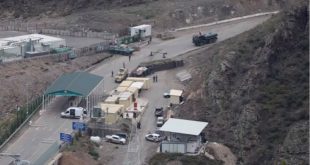Thousands of Chinese troops streamed into Hong Kong in the small hours of Thursday morning, prompting alarmed witness reports after weeks of threats from Beijing to intervene militarily in the city’s protest crisis.
Chinese state media later described the move as an “annual… routine” rotation of Hong Kong’s permanent garrison.
But the scenes of armored carriers and trucks moving in convoy through the city streets, and the manner of the announcement in the official Xinhua news agency, led pro-democracy activists to call it yet another “warning” that China is willing to use force to bring the ongoing unrest to an end.
It is now more than 80 days since protests began over a now-suspended extradition bill that would have made it easier for Hong Kong to deport criminal suspects to the mainland. The protests have spiraled into the biggest broad-based political challenge to Beijing’s rule since the city was handed back to China by Britain in 1997.

China has made clear in recent weeks that it considers military intervention in the crisis a viable option, despite US warnings that it would risk a repeat of the 1989 Tienanmen Square massacre.
Xinhua quoted the People’s Liberation Army (PLA) as saying that a handover ceremony for the Hong Kong garrison was held overnight.
It quoted an army major as telling the newly stationed troops: “This time the task has a glorious mission. The responsibility is great. The job is difficult. The time for a true test has arrived.”
Xinhua said the soldiers in the new rotation were educated in Hong Kong’s laws and vowed to defend the nation’s sovereignty.
Liu Zhaohui, the garrison’s deputy chief of staff, said on the CCTV channel that the PLA would “firmly implement the guideline of ‘one country, two systems’” – the principle by which Hong Kong is considered a part of China but with an independent judiciary and certain democratic rights not enjoyed by those on the mainland.
Experts noted that, while the garrison change had indeed been expected, reports in Chinese media on the previous troop rotations in 2017 and 2018 made no reference to defending “one country, two systems”.
 Alghadeer TV Alghadeer TV
Alghadeer TV Alghadeer TV
